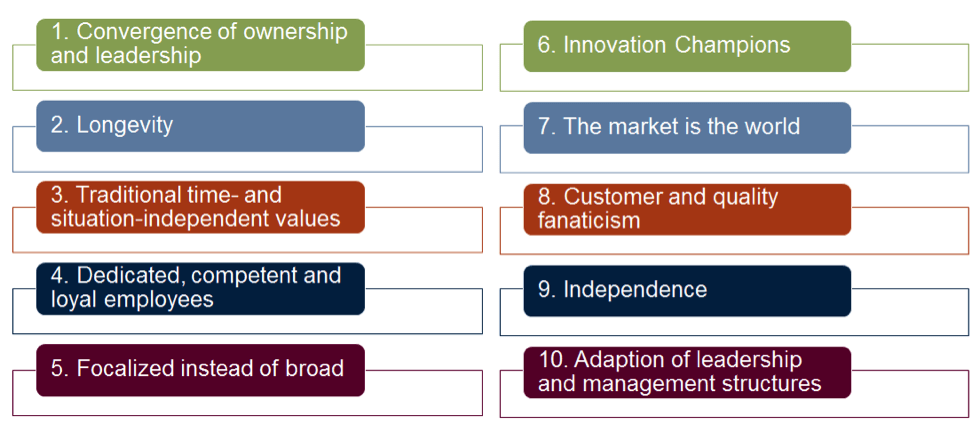
Image source: Pixabay via Pexels
Family businesses have now reached a broad public awareness. Finally. 75% of all companies in Europe are family enterprises, which account for almost half of the gross domestic product and account for 50% of all jobs. The macroeconomic importance is just as evident as the social and societal responsibility that family businesses have for their region and their employees.
In this respect, family businesses are no better or worse than other companies. Some of the world’s most famous corporate scandals also concern family businesses. We all know badly run family businesses, but what makes the successful family business so special? What are the characteristics of a successful family business? Is there even a common success-DNA?
Family businesses are radically different. They follow their own logic, which is strongly influenced by the concentrated property structure, without being detached from the basic principles of market and business. Following are the ten characteristics of the most successful family enterprises, as a result of the underlying study with over 200 family businesses in Europe[1]:
 1. Convergence of ownership and leadership
1. Convergence of ownership and leadership
The convergence of ownership and leadership provides the framework for responsibility. Any decision that a family makes within the company has consequences both for the company as well as for the family. The causality of cause and effect of the decisions is more pronounced in family enterprises than in all other types of companies. This situation is most clearly seen in the case of partners who are personally liable, who, by definition, take personal responsibility when they make mistakes. The concentration of ownership and leadership in one’s own hands or family also creates speed—speed in decision-making and implementation. At best, this resulting speed is an incredibly important competitive advantage for the family business. And in the worst case, if wrong, hasty, overly risky decisions are made, this concentrated decision-making power can also mean the end to the family business. The decision-making ability is, therefore, not a guarantee for quality, but with the right decisions, the convergence of ownership and management can give the company a competitive advantage.
2. Longevity
To be truly successful, family businesses must be sustainable and multi-generationally oriented. They have a healthy management that controls the company according to reasonable operating and financial criteria. The top priority in the management of family businesses is the survival and maintenance of the company in the family. Short-term opportunities for return and growth as well as possible entrepreneurial opportunities are consistently subordinated to these goals. In case of doubt, the short-term return is sacrificed for the long-term strengthening of the company. In family businesses, long-term sustainability is always linked to generational change. Only one-third of all family-owned companies make it into the third generation and only about 4 percent into the fifth. Accordingly, the risk of succession is probably the greatest strategic risk of a family business. The best family-run companies, therefore, plan the generational succession with sufficient lead-time, use generational agreements, and manage the family as professionally as their companies.
3. Traditional time- and situation-independent values
How could it be any different! Successful family businesses thrive on healthy, traditional values, which are neither time- nor situation-bound. Reliability, quality, longevity, performance, honesty, credibility, appreciation, family, and loyalty characterize the exceptional value-DNA-strand. This value model is also in line with the findings of The Henokiens[1], which places great importance on the value of family loyalty.
4. Dedicated, competent and loyal employees
“Employees come into the company, but they leave their superiors.” Employee fluctuation is very low in the best family businesses. Family businesses appreciate their employees, acknowledge them, support them in the development of competence and personality, they pay fairly and well. In many family businesses of the 10th generation, employees who work in the company’s 10th generation have grown with the company; have experienced hard times and good times. Often, entrepreneurs describe the employees as an extended part of the family and cultivate this great “corporate familyness” as a natural part of corporate culture. “We have the most competent, loyal, and dedicated employees.” This statement from many entrepreneurs describes the best employee-DNA-characteristic.
5. Focalized instead of broad
What is the right thing to do: diversify or concentrate? This question has always occupied professors, consultants, managers, and entrepreneurs. Is there a clear answer? Successful family businesses seem to have found their answer. Their companies’ focus is pointed, not broad. They are specialists who focus on their core competencies and enter into markets and sectors where, due to their core competencies, they have the potential to play a leading role. In some cases, entrepreneurial families have several companies, often under a family-holding structure, but these individual operating companies are again highly concentrated and specialized. They are niche providers that are leaders in a small market through specialization. “Better a big fish in a small pond than the other way round,” seems to be the motto.
6. Innovation Champions
One of the consequences of the concentration is the need to innovate products, services, systems, processes, and even business models. The innovative power is a decisive DNA property of successful family businesses. It is based on a distinctive culture of innovation, characterized both by functioning innovation processes and by a culture of openness and error tolerance. Innovation emerges in the communication between people: intense, critical, and conflicting. The best family businesses are creating, nurturing, and communicating with each other in the development of products and services. At the same time, the requirement for innovation in the best family businesses is clearly defined: innovations must either create superior, affordable value for the customer or increase the efficiency or productivity of the company.
7. The market is the world
The second consequence of concentration is the geographical impact of the company: the more focused and pointed the company is, the necessarily wider the geographic market boundaries to reach both critical dimensions as well as the company’s growth potential. Successful family businesses never forget their local roots, but their market is the world. They value other countries, cultures, and customs and feel comfortable with international business. The royal class of internationally active family businesses has world champions. They are world market leaders in their niche positioning.
8. Customer and quality fanaticism
Companies and families usually have the same name for family businesses. With its name, the family stands for the company’s seriousness, the quality of products and services, the professionalism and sympathy in the relationship with the customer. The good reputation of the company and the family is a valuable asset, but also uncompromising quality and the exceptional dealings with customers distinguish the best family businesses and represent important competitive advantages. Statements such as: “If the customer has a problem, we put everything down until we have solved it” and “I guarantee with my name” are recurring convictions that underpin what we call a healthy customer and quality fanaticism.
9. Independence
A predominant basic principle in successful entrepreneurial families is independence. This principle, which is usually characterized by the family, clearly has an impact on the strategic, business, and financial management of the family business. Independence means primarily independence from banks. This principle has grown from generation to generation in many family businesses and is often the result of past, very negative experiences with credit institutions, because “anyone who does not bite off the bosom of the bank remains a baby forever.” Accordingly, the best family companies not only have very high equity ratios, which are often at 70% and above, but always have sufficient liquidity.
10. Adaption of leadership and management structures
Over the course of history, family businesses have evolved from small structures to medium-sized and large company groups, which often operate around the world, employing several thousand people and generating turnovers of several billion Euros. In the same way, the owners’ families are evolving: from the individual entrepreneur to sibling companies, to ownership structures, which also include a few hundred shareholders from the family, because the existence of a company over generations inevitably entails a fragmentation of the shares. In the course of their evolution, the best family-owned businesses are creating the leadership and management structures to master the challenges of a growing company and a growing family. If they miss adjusting their so-called corporate and family governance, they would implode faster than they could imagine.
Studies are similar to controls. Both represent a pure cost factor if the findings do not serve as a discussion and decision-making basis. However, they are valuable as they support the development of counter-measures, projects, and activities. The findings on the “DNA of successful family businesses”[2] are intended not only to contribute to the consolidation of family businesses in the public’s perception but also to provide companies with a useful reference framework to critically review their own corporate DNA and to correct any weaknesses.
Markus Weishaupt is expert for family businesses, senior lecturer at the University of Applied Science in Kufstein (Austria), managing partner of Weissman Italia and partner of the WeissmanGruppe. He supports family businesses and entrepreneurial families during change and succession processes and as a member of family boards. He is a requested business consultant in the fields of strategy, leadership and organizational development. As key-note speaker in German, Italian and English he imparts complex contexts in an easy and understandable way. Furthermore Markus Weishaupt is the author of different books and articles about the world of family businesses and chief editor of the Swiss management dossier “ManagementLetter”.
[1] Weishaupt Markus (2015), Radikal anders. Die DNA erfolgreicher Familienunternehmen. Campus Verlag, Frankfurt.
[2] The Henokiens is an association of companies who have been continuously operating and remain family-owned for 200 years or more, and whose descendants still operate at management level. www.henokiens.com
[3] Weishaupt Markus (2015), Radikal anders. Die DNA erfolgreicher Familienunternehmen. Campus Verlag, Frankfurt.


 1. Convergence of ownership and leadership
1. Convergence of ownership and leadership






